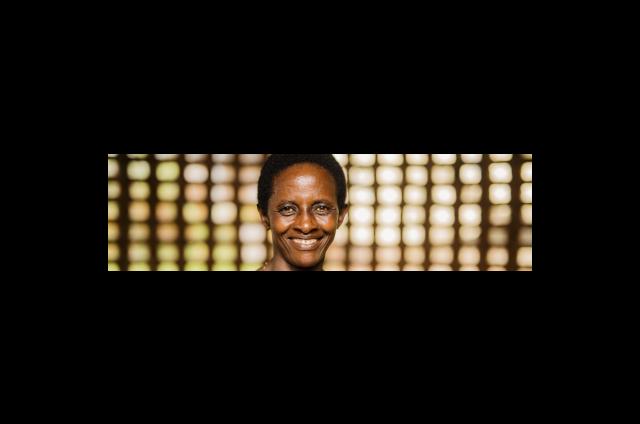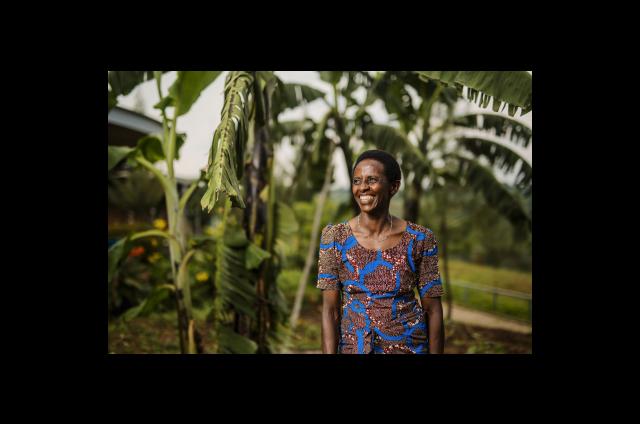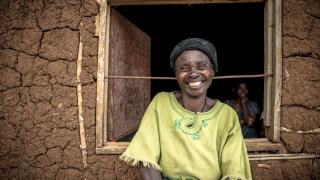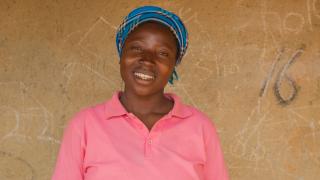Christine
Christine
Christine, 48, is a graduate of the Stronger Women, Stronger Nations programme in Rwanda. She is the mother of two boys and two girls. Her husband passed away due to wounds inflicted upon him during the genocide.
Pregnant with her first child during the 1994 genocide in Rwanda, Christine hid. Never far from death; it seemed like the best option. But Christine was determined to join her husband who was hiding at work. It meant risking everything, but she had to give her unborn child a chance to live. She needed her family to survive.
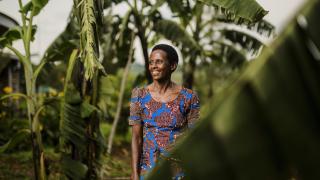
When I was 23 years old and pregnant with my first child, the genocide started. My husband worked in a company with foreign staff. When the killing started, he was at his workplace, and I was at home. We were separated. I was scared for my life so when a Hutu friend of mine invited me over to his house, I went. His wife was Tutsi. To convince me, he told me:
Come to our house; if they kill you, they’ll kill my wife too.
I took refuge in his house but someone in the neighbourhood alerted the génocidaires. They came and called my outside. They asked for my ID to check my ethnicity and beat and tortured me. I thought that was the end of me. The génocidaires took me and a number of other people from the neighbourhood to kill us. When it started to get dark, they left us at a deserted house and said they would come back for me tomorrow. They forgot about me. I returned to my friend’s house.
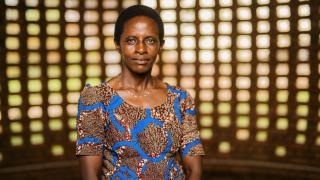
While adults couldn’t walk around freely, children were allowed to go to the market. I asked my friend’s son to find out where my husband was and to tell him that the time to deliver our baby was approaching. He was able to go to my husband’s office and find him alive. I was shocked to hear that my husband was still alive. I knew I had to join him. If I stayed at my friend’s house, I’d be killed. If I went outside, I’d be killed. At 08:00am I decided to leave my friend’s house with one dress and a jacket. Before leaving I thanked my friend and told him:
I just want to be killed so that this terror is over.
On my way to finding my husband, I saw armed génocidaires. One of them asked me if I was going to give birth. I didn’t want to look at his face. I was weak and hungry and walking without purpose. I kept walking and saw the man walking to a post with other armed men. I decided to ignore them and continue. Near the national hospital, there was another post of the génocidaires. When they saw me, they said, “just leave her. She won’t survive anyway.” I was weak and hungry. I walked away. When I arrived at my husband’s workplace, I collapsed because I was tired and traumatised. I found that my husband and some others were hiding there. We saw each other and hugged.
Just leave her. She won’t survive anyway.
While inside the building, we could hear gunshots. My husband and I found a room to stay in. I was about a week away from giving birth. We had nothing to eat or drink and were barely surviving. I was just waiting to give birth, but I didn’t even know what birthing is. it was my first pregnancy and neither myself nor my husband had any experience.
The gunshots were increasing. For 24 hours, I was in pain and we have no one to help us. My husband was so worried. He told me “let me take you to the hospital. Whatever happens, happens.” I told him, “I love you and I want you to survive so let’s just stay here and wish for the best.” But my husband crawled to a nearby church where a number of people were hiding and found a doctor among them.
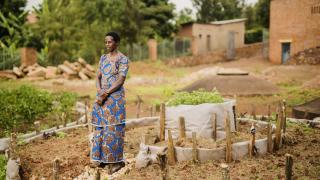
The doctor came and asked for a knife and some thread. He used the thread from a sack and a kitchen knife to help me deliver my baby and stitch my wounds. We paid some children to bring us water, so I could clean up.
It came from a ditch where the génocidaires had dumped people’s bodies. I used the water to clean myself and the baby.
I was cold and hungry and had no milk.
We heard shooting and thought it was the génocidaires, so we stayed inside the church, but the Rwandan Patriotic Front had come and helped other people escape. We stayed there and, soon after the génocidaires were back. They hit us with guns and injured my husband. They said they would take us to where other Tutsis were and kill us.
We waited in the church for two days – waiting to be killed, but the armed men never came back. We left the church and returned to our neighbourhood.
Our home was destroyed. We had nothing left.
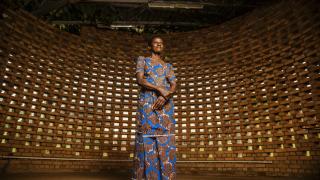
In 1995, I gave birth to my second child. Around that time, we learned that my mother-in-law was still alive and staying in another district. Her husband and other children had been killed. We decide to all move to Nyaruguru District and start over. It wasn’t easy. We had very little and suffered in poverty. We couldn’t afford medicine and my husband’s wound from being beaten by the génocidaires grew worse. My mother-in-law was traumatised and disabled. We barely made ends meet through odd farm jobs. Meanwhile, I gave birth to another child in 1998 and another child in 2002.
In 2003, my husband’s wound deteriorated, and he passed away. My oldest child was eight and my youngest one. I was now responsible for taking care of my four children and my mother-in-law.
In 2004, Women for Women International came to Nyaruguru, and because the organisation helps poor women, I was selected to participate in the Stronger Women, Stronger Nations programme. I really loved the business training because it showed me how I can start with a small amount and sustain my family. I also joined the Village Savings and Loan Association (VSLA) and started saving money. I put all my earnings towards my children’s food and education. We used hand me downs but made sure everyone could go to school.
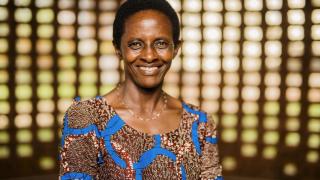
I’m now part of a cooperative. We farm together and earn a good stable income.
I was able to send my second child to become an apprentice mechanic and now he is earning his own money. My third child graduated high school and my youngest is in sixth grade. My oldest, the daughter that I gave birth to during the genocide is finishing university.
I’m really happy now. I now believe I will make it through and so will my children.
Read more stories
Grace
subtitle:
I was alone and had to take care of the children who were all very young at the time. I couldn’t imagine them growing without their father around. He was the one who provided for them.
Claudine
subtitle:
I know that I should take courage because I survived a hard situation. Every day, I have to wake up and pray and say, thank you God, for I’m still alive. It was hard but now I’m here.
Zainab
subtitle:
During the sessions on decision-making and women’s rights, my eyes were opened. It made me appreciate myself more as a human being.

